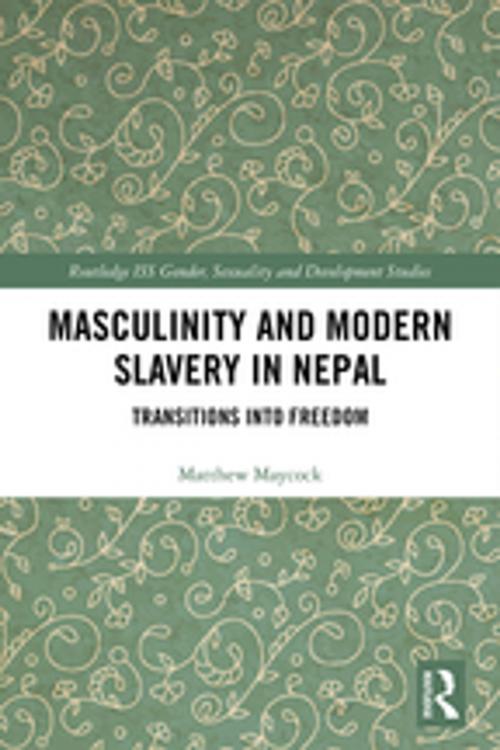Masculinity and Modern Slavery in Nepal
Transitions into Freedom
Nonfiction, Social & Cultural Studies, Social Science, Gender Studies| Author: | Matthew Maycock | ISBN: | 9781351398398 |
| Publisher: | Taylor and Francis | Publication: | December 7, 2018 |
| Imprint: | Routledge | Language: | English |
| Author: | Matthew Maycock |
| ISBN: | 9781351398398 |
| Publisher: | Taylor and Francis |
| Publication: | December 7, 2018 |
| Imprint: | Routledge |
| Language: | English |
South Asia is the region with the highest number of slaves globally according to the Global Slavery Index. Bonded labour affects between 15 and 20 million labourers within the region, and is shaped by locally specific interconnections between ethnicity, class, caste and, critically, gender structures. Masculinity and Modern Slavery in Nepal explores the role of masculinity in shaping the structures and experience of slavery and subsequent freedom.
While many I/NGOs and human rights organisations use freedom from slavery as a powerful and emotive goal, the lived reality of freedom for many bonded labourers often results in disappointment and frustration as they navigate diverse expectations of masculinity. Taking Nepal as a case study, the book illustrates how men’s gendered experiences of bondedness and freedom can inform perspectives on the transition to freedom and modernity in South Asia more broadly. Researchers of modern slavery, gender studies, and South Asian studies will be interested in the rich analysis on offer in this book.
South Asia is the region with the highest number of slaves globally according to the Global Slavery Index. Bonded labour affects between 15 and 20 million labourers within the region, and is shaped by locally specific interconnections between ethnicity, class, caste and, critically, gender structures. Masculinity and Modern Slavery in Nepal explores the role of masculinity in shaping the structures and experience of slavery and subsequent freedom.
While many I/NGOs and human rights organisations use freedom from slavery as a powerful and emotive goal, the lived reality of freedom for many bonded labourers often results in disappointment and frustration as they navigate diverse expectations of masculinity. Taking Nepal as a case study, the book illustrates how men’s gendered experiences of bondedness and freedom can inform perspectives on the transition to freedom and modernity in South Asia more broadly. Researchers of modern slavery, gender studies, and South Asian studies will be interested in the rich analysis on offer in this book.















